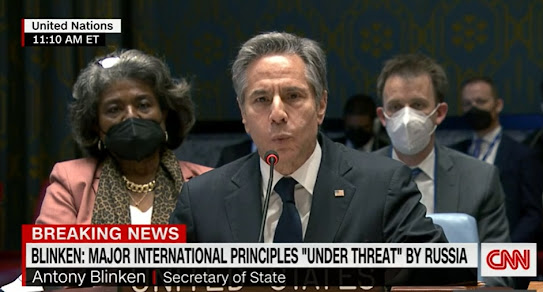The UN's Dirty Little Secret
However, he is quite wrong if he expects the UN to be able to do anything about it.
That's because as currently constituted, the UN is not only dysfunctional, it is effectively non-functional. Why? Because the discussions at the Security Council, the inner 'cabinet' of the UN where all the substantive decisions are taken, are subject to a veto. That's the dirty little secret at the heart of the matter. It's not called a veto, of course – but that's what it is. The technical description is "a failure to concur" – and that means that if any one of the five 'Permanent Members' of the Security Council disagree with the outcome of any vote taken, the UN cannot take any action to enforce it.
So how exactly does Secretary Blinken expect the UN to do anything? If a resolution is put forward calling for Russia to stop threatening Ukraine, or demanding that Russia state publicly that they will not invade Ukraine (crucially different to saying they "have no plans" to do so), the Russian delegation can simply vote against it, just as they vetoed any UN action over Syria, or the US has vetoed any action over Israel. With the current system in place, the UN's hands are tied.
It's time for a rethink. Though it might have been acceptable in the aftermath of World War II, there is no excuse for a veto in the wired-up world of the 21st century. To anyone under the age of 30, the world is effectively one place, and we need a forum where global issues that affect us all can be raised, debated and decided democratically – just as political issues are debated and decided at the national level. The veto at the international level needs to be replaced by a vote.
For practical suggestions about how that might be done using tools that are already available to us, see the final chapter of my book SPEECH! How Language Made Us Human, which is called WISDOM: Raising the Game...




Comments
Post a Comment